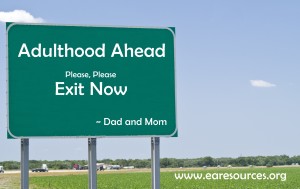 Marriage can be difficult. In order to survive, many couples need outside support or they will crumble. A strong marriage requires a support system which can include: parents, friends, relatives, and counselors. Supportive parents are especially essential during the early years of marriage, but when disagreement arises in a marriage, what role should you as a parent take?
Marriage can be difficult. In order to survive, many couples need outside support or they will crumble. A strong marriage requires a support system which can include: parents, friends, relatives, and counselors. Supportive parents are especially essential during the early years of marriage, but when disagreement arises in a marriage, what role should you as a parent take?
The role of a parent during times of conflict within a marriage is a complicated issue. If your child is having a rough time in their marriage relationship, here are some thoughts how to help support without crossing boundaries.
1. Listen
Listen using empathy to support your child. Don’t seek to fix them or their spouse. Ask questions to seek understanding of who they are, and how they feel. Offer encouragement that they are not alone, and give them hope that they will make it through this conflict. Remind them of your marital struggles, and the growth your marriage encountered through them.
It is more difficult to show your support for your child when they make decisions and embrace values different than your own. Watching a child make bad decisions is a painful process, but God often uses pain to mold our character and direct our steps. One mother says, “I learned to be quiet and support him even though I strongly disagreed with his choice and his lifestyle. By taking a neutral role, our relationship grew back to the point where my son turned to me.” Maintaining a healthy relationship while sharing different values will show them your love and support while affirming their newly-founded autonomy.
2. Allow Autonomy
 Autonomy is the ability of an individual to make their own decisions and to deal with the consequences. Allowing your adult children to have autonomy is difficult especially when they are dealing with the consequences of poor decisions. However, as one parent says, “A child has to feel the pain of his own choices before they will make the decision to change.” A child’s autonomy includes the development of their marriage relationship.
Autonomy is the ability of an individual to make their own decisions and to deal with the consequences. Allowing your adult children to have autonomy is difficult especially when they are dealing with the consequences of poor decisions. However, as one parent says, “A child has to feel the pain of his own choices before they will make the decision to change.” A child’s autonomy includes the development of their marriage relationship.
In a marriage, a couple forms a new unit as they leave and cleave. In Genesis 2:24, the Bible states. “For this reason, I man will leave his father and mother, and cleave unto his wife, and the two will become one flesh.” One emerging adult describes the transition, “When I started dating, I told my mom everything. I gradually started doing this less, but it has taken time and effort. My mom and I are really close, and the transition has been hard. Now that I am married, I need to be protective of my new marriage relationship.”
As they face difficulties, the couple must work towards decisions as a couple, and then learn to deal with the consequences. This does not mean you cannot encourage, offer general principles of advice, and listen. If the couple needs additional help, direct them to other sources of counsel including a pastor, counselor, or mentors. In the end, you want your child to feel as if they made the decision, and you are supporting their autonomy.
3. Forgiveness and Acceptance
A family is not made from perfect relationships. A family is made when people stick together through the hurt and pain by healing and reconciliation. One mother writes, “We all will make mistakes, but the simple phrase I love you and I am sorry goes along way.” These two phrases are especially helpful tools when working with your emerging adults.
Even listening to your child talk about the hurt in their marriage could damage your relationship with your new in-law. One parent says, “I have found that there is a need for me to forgive when there have been deep hurts against my child and ask God to help me be the loving parent that my in-laws need.”
Guard your heart and be aware that you will have to find grace and forgiveness for them. As you add a new member to your family, mistakes will be made. Feelings will be hurt. Tempers will be lost. Sometimes this hurt happens because of direct action, but at other times it is because of pain that was inflicted upon your child.
Remember that not all conflict is bad for your children.
Conflict can be an instrument of God to work in the marriage and the lives of both partners. God could be using their disagreements to make the marriage healthier and happier.
Don’t run to rescue them, but let God use conflict in your child’s life to remake them. In the meanwhile, you pray. One parent reflects on this need. “It is critical for parents to be daily praying for God to grow the marriage.”
Pray that they will learn to communicate. Pray that they will each be humble. Pray that they will become more like Christ.
I have the perfect Christmas gift for you! Actually, Christmas is too far away. How about buying it for a birthday present, or maybe simply buy it as soon as possible. (I am totally kidding.)







 I am not a fan of generation wars. Tom Brookaw’s book The Greatest Generation is a great tribute to those of that era; however, the title and concept that other generations are not as great is unfortunate. Maybe some people deem inter-generational conflict and competition as healthy and makes a society (and the church) more productive. This is only true if you value productivity (if that is even truly an outcome), over unity.
I am not a fan of generation wars. Tom Brookaw’s book The Greatest Generation is a great tribute to those of that era; however, the title and concept that other generations are not as great is unfortunate. Maybe some people deem inter-generational conflict and competition as healthy and makes a society (and the church) more productive. This is only true if you value productivity (if that is even truly an outcome), over unity. Do you sometimes feel as if you identify with Millennials more than your own generation? Is it because you are “young at heart”? Or do you simply have different values than your peers?
Do you sometimes feel as if you identify with Millennials more than your own generation? Is it because you are “young at heart”? Or do you simply have different values than your peers?

 What do your parents owe you?
What do your parents owe you?




 I am sorry that what I am doing is not to your liking. Not everything turned out as you expected. Disappointment is hard. I never promised that this would be easy. I know that you may want to change your mind. I cannot make you stay, but please hear me out before you leave.
I am sorry that what I am doing is not to your liking. Not everything turned out as you expected. Disappointment is hard. I never promised that this would be easy. I know that you may want to change your mind. I cannot make you stay, but please hear me out before you leave. While you wait for this storm to cease and your pain to fade,
While you wait for this storm to cease and your pain to fade, I wonder what it will look like when it is completed. It is fun to dream about, but today I am looking at what it is now – and that isn’t the best.
I wonder what it will look like when it is completed. It is fun to dream about, but today I am looking at what it is now – and that isn’t the best.